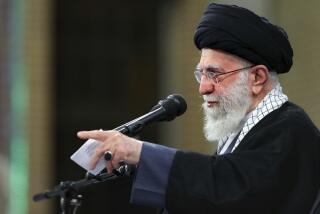Perez de Cuellar Begins Baghdad Talks, Hears Demands for Punishment of Iran
- Share via
BAGHDAD, Iraq — President Saddam Hussein of Iraq urged the United Nations on Monday to take “punitive measures” against Iran for failing to respond to a Security Council call for a cease-fire in the Persian Gulf War.
Iran and Iraq accused each other of starting new fighting to wreck the peace mission of Secretary General Javier Perez de Cuellar. But there was no independent confirmation of any significant military action.
Perez de Cuellar arrived in Baghdad on Sunday after two days of talks in Tehran, where Iranian President Ali Khamenei told him there could be no end to the war until the United Nations branded Iraq the aggressor and punished it.
Heavily Guarded Palace
President Hussein met Perez de Cuellar in his heavily guarded palace on the banks of the Tigris River and repeated a demand for sanctions against Iran made earlier in the day by Foreign Minister Tarik Aziz.
The official Iraqi News Agency quoted a government statement issued after the talks as saying the president demanded that Iran abide by the July 20 Security Council resolution “in its entirety.”
The resolution calls for an immediate, unconditional cease-fire, withdrawal of troops to internationally recognized borders and an exchange of prisoners. Iran would have to withdraw from Iraqi territory. It also calls for sanctions, including an arms embargo on whichever country fails to comply with its provisions.
Hussein rebutted Iran’s charges that Iraq started the war, telling Perez de Cuellar on Monday evening that “all facts prove--by tangible evidence--that the Iranian regime started aggression and war.”
Major Stumbling Block
The question of who started the seven-year-old Persian Gulf War has become the major stumbling block to implementation of the Security Council resolution.
Iraq is generally recognized as having begun hostilities with an invasion across the Shatt al Arab waterway in September, 1980.
In Monday’s talks with the U.N. leader, Iraqi officials drove home their oft-stated position that they will accept the U.N. resolution, but only if Iran does the same. Iran has refused to commit itself to acceptance.
Despite reports that Iran appears to have softened its hard-line stand on the war, Iran has long said that “punishment of the aggressor” included Hussein’s ouster and payment of billions of dollars in war reparations.
However, Iran is under increased pressure to end the conflict, in which by Western estimates more than 1 million people have been killed or wounded.
The differences between Iran and Iraq over the resolution appeared to leave Perez de Cuellar with little room for maneuver in his mission. He is expected to return to New York today.
U.S. Pressure
Secretary of State George P. Shultz said last week that Washington would press for sanctions against Iran if Iranian leaders did not give Perez de Cuellar a definite acceptance.
Both Iran and Iraq have observed an undeclared truce in the so-called tanker war since Thursday, and Iraq has reined in its marauding fighter-bombers.
Iraq has been attacking Iranian ships since 1984, trying to throttle Iran’s oil exports. Iran has been attacking ships of other nations in the gulf in retaliation. It singled out Kuwaiti tankers, accusing Kuwait of helping Iraq.
During the lull, a convoy of two Kuwaiti tankers flying U.S. flags and escorted by U.S. warships sailed through the Strait of Hormuz into the Gulf of Oman on Monday after a record 48-hour dash from Kuwait at the north end of the Persian Gulf, shipping executives reported.
Eighth Convoy
It was the eighth convoy since the United States began “reflagging” 11 Kuwaiti tankers under the Stars and Stripes to afford them U.S. Navy protection from attacks by the Iranians. Earlier convoys took three days to transit the 550 miles.
The State Department announced in Washington that another convoy of three Kuwaiti vessels, guarded by two U.S. warships, entered the Persian Gulf through the Strait of Hormuz on Sunday. The convoy crossed paths with the outgoing formation early Monday. One of the incoming vessels was the supertanker Bridgeton, which struck a mine in the gulf July 24 and is being shepherded to Dubai in the United Arab Emirates for repairs.
More to Read
Sign up for Essential California
The most important California stories and recommendations in your inbox every morning.
You may occasionally receive promotional content from the Los Angeles Times.













